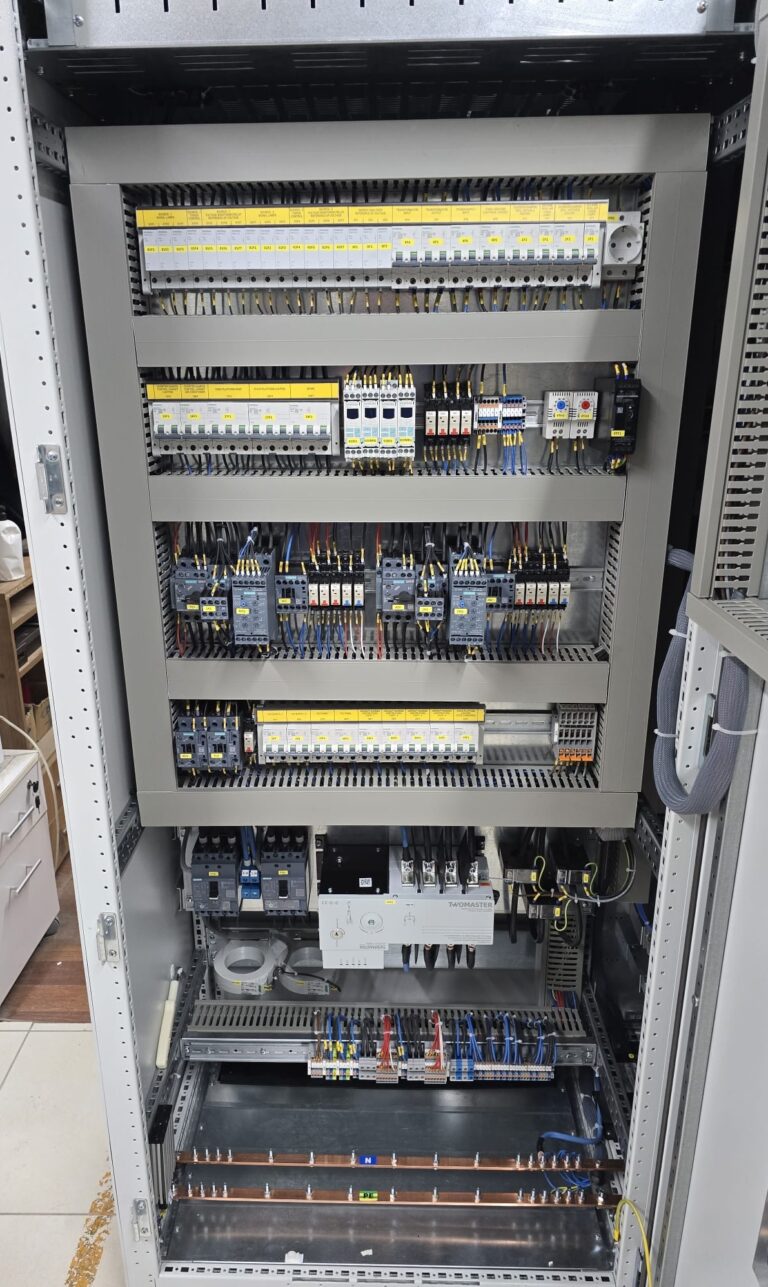What is Smart Energy Management? Why is it Necessary?
Smart energy management refers to the use of advanced technologies and integrated systems to monitor, control, and optimize energy consumption...
Devamını Oku

In today’s rapidly evolving energy landscape, adaptable and innovative technologies play a crucial role in shaping national and global energy strategies. One of these cutting-edge technologies is the FSRU—Floating Storage Regasification Unit—a floating facility designed to store liquefied natural gas (LNG) and convert it back into its gaseous form. Unlike traditional onshore terminals, FSRUs operate from the sea, offering faster deployment and flexible energy distribution in regions with limited infrastructure.
Answering the question “What is fsru” requires more than just a definition; it reflects a broader concept of strategic energy independence and dynamic resource management. These vessels are capable of receiving, storing, and regasifying LNG, ensuring a consistent energy supply without relying on land-based terminals. The fsru ship is an engineering marvel that exemplifies efficiency and mobility in global energy networks. Furthermore, understanding what does fsru stand for or what does fsru mean reveals the pivotal role these floating systems play in enhancing energy security, particularly during crises. In essence, fsru expansion represents a forward-looking solution that aligns with sustainability, resilience, and technological advancement in the energy sector.
A FSRU (Floating Storage Regasification Unit) is a floating facility specifically designed to store liquefied natural gas (LNG) and convert it back to its gaseous form when needed. Unlike traditional land-based terminals, FSRUs can be deployed quickly at coastal locations, making them ideal for countries or regions lacking fixed infrastructure. Their mobility and flexibility have made them a popular solution in today’s global energy markets. For those wondering what is fsru, it is essentially a mobile, cost-effective, and scalable energy terminal that bridges LNG import and gas distribution with impressive speed and efficiency.
A fsru ship receives LNG from carrier vessels and stores it in cryogenic tanks at temperatures below -160°C. When demand arises, the onboard regasification system transforms the LNG back into natural gas, which is then transferred via underwater pipelines to onshore networks. This process eliminates the need for time-consuming construction of onshore terminals. In this context, understanding what does fsru stand for and what does fsru mean becomes crucial for policymakers and engineers shaping modern energy infrastructure. As fsru expansion continues globally, it offers a promising and sustainable alternative for countries looking to secure their energy futures.
A fsru ship operates as a self-contained, offshore terminal for handling liquefied natural gas (LNG). The process begins when LNG is transferred from a carrier vessel to the FSRU’s insulated storage tanks, where it remains in liquid form at cryogenic temperatures. When natural gas is required, the FSRU uses onboard regasification systems—typically heat exchangers that rely on seawater or other heat sources—to warm the LNG and convert it back to gas. This regasified LNG is then fed into subsea pipelines and delivered directly to onshore gas grids. This entire system operates under strict automation and safety protocols, ensuring continuous and reliable service.
Understanding what does fsru stand for involves recognizing the dual nature of the system—it’s both a floating storage facility and a regasification plant. The beauty of the fsru model lies in its ability to be deployed and commissioned in far less time than traditional onshore terminals. Because of this efficiency, FSRUs are considered essential for meeting sudden spikes in gas demand or filling supply gaps during energy transitions. As countries seek to diversify their energy portfolios, the importance of fsru expansion becomes even more apparent. This technology is reshaping how nations think about energy access, mobility, and resilience.
A fsru ship performs three essential roles: receiving LNG, storing it safely at cryogenic temperatures, and regasifying it for onshore delivery. These vessels act as mobile terminals that eliminate the need for fixed infrastructure. So, when we ask what is fsru, we’re referring to a multi-functional platform that ensures energy availability with speed, efficiency, and strategic deployment capabilities.
Once the LNG is regasified onboard, the fsru connects to the land-based infrastructure through underwater pipelines or flexible hose systems. This seamless integration allows for efficient gas flow to national grids. In this context, what does fsru mean extends beyond storage—it represents a critical link between offshore capabilities and onshore consumption, ensuring uninterrupted energy distribution.
The most notable advantage of a fsru is its rapid deployment capability. Traditional onshore LNG terminals often take years to plan and construct, while an FSRU can be operational in a matter of months. This makes it an ideal solution for countries facing urgent energy demands or lacking the infrastructure for permanent LNG facilities. The mobility of a fsru ship also provides flexibility—vessels can be relocated to different ports as market needs evolve, which is particularly valuable for seasonal or temporary supply challenges.
From an economic perspective, FSRUs significantly reduce initial capital expenditure compared to onshore plants. They also allow governments and energy companies to test market viability without committing to long-term infrastructure. In terms of strategy, knowing what is fsru and what does fsru stand for means understanding its role in diversifying energy sources and minimizing risks during geopolitical or supply disruptions. As fsru expansion accelerates, it enables countries to strengthen energy security, increase LNG import capacity, and adapt more quickly to evolving market demands.
One of the key benefits of a fsru is its ability to be installed and commissioned rapidly, often within months. Unlike land-based terminals, it offers immediate operational capability. This makes fsru expansion an ideal choice for markets needing agile solutions. For decision-makers exploring what does fsru mean, the answer lies in its unmatched adaptability and time-saving deployment.
In times of geopolitical instability or supply chain disruptions, a fsru provides a reliable backup solution for continuous gas delivery. It enables rapid response without requiring permanent infrastructure. Understanding what is fsru in this context highlights its strategic role in national energy planning and emergency preparedness—making it essential for countries prioritizing energy resilience and crisis readiness.
The use of fsru technology has expanded rapidly across the globe as countries seek flexible and cost-effective LNG import solutions. In Asia, nations like Japan, India, and South Korea have incorporated multiple fsru ships into their energy systems to meet seasonal demand and ensure energy security. Meanwhile, South American countries such as Brazil and Argentina have also embraced fsru expansion, finding it ideal for temporary or emergency energy needs. Europe, in response to shifting gas supply dynamics, has increased FSRU deployment to diversify away from pipeline dependency.
Turkey has emerged as a regional leader in fsru adoption, leveraging its strategic geographic location to enhance energy security. With operational FSRUs in Dörtyol and Aliağa, Turkey has significantly increased its natural gas import flexibility. These projects have not only reduced dependency on fixed infrastructure but have also enabled quicker responses to fluctuations in demand. For Turkish energy planners, understanding what is fsru and what does fsru stand for has translated into proactive policy and infrastructure investment. As fsru expansion continues, Turkey serves as a model for integrating mobile LNG systems into a comprehensive energy strategy.
Turkey has successfully implemented fsru projects in key coastal areas like Aliağa (İzmir) and Dörtyol (Hatay), enhancing its LNG import capacity. These facilities allow for quick adaptation to changing energy needs. For policymakers and analysts exploring what does fsru mean, Turkey’s model demonstrates how mobile LNG infrastructure can strengthen national energy resilience and supply security.
Around the world, countries are accelerating fsru expansion to meet growing energy demands with greater flexibility. Nations like Japan, Brazil, and India have adopted the fsru ship model to diversify imports and boost energy resilience. Understanding what does fsru stand for globally reflects a shift toward mobile, scalable LNG solutions that reduce infrastructure costs and deployment times.
Adatech offers high standard solutions in FSRU (Floating Storage Regasification Unit) projects with its expert engineering staff and multidisciplinary approach. With its in-depth knowledge of electrical, automation and mechanical systems, Adatech provides comprehensive support in all engineering phases needed in FSRU infrastructures. From medium and low voltage systems to fire detection and alarm solutions, from the design and integration of automation systems to mechanical applications, Adatech creates added value in FSRU projects with its safe, sustainable and innovative applications. Full compliance with international standards in the installation, commissioning and technical maintenance processes carried out on site is one of the cornerstones of Adatech’s quality approach.
Adatech develops end-to-end solutions in all processes from the engineering design of the connection points of FSRU vessels with onshore facilities to the commissioning of automation and SCADA systems. Adatech’s engineering capability in these systems, which are critical for energy supply security, brings speed, efficiency and operational reliability to projects. For Adatech, FSRU is not only an LNG solution model, but also a concrete reflection of high engineering understanding and technological competence. It stands out as a player that makes a difference in the energy sector with its engineering contribution to the systems used in floating LNG terminals.

Smart energy management refers to the use of advanced technologies and integrated systems to monitor, control, and optimize energy consumption...
Devamını Oku
An MCC panel (Motor Control Center) is an essential electrical distribution system used in industrial facilities to control and manage...
Devamını Oku
Image processing systems are technological solutions designed to analyze, interpret, and manipulate digital images using computer-based algorithms. These systems play...
Devamını OkuPROTECTION OF PERSONAL DATA
WEBSITE COOKIE POLICY
Your personal data; It is one of the leading principles of our Organization to protect the privacy of visitors to the website (www.adatech.com.tr) operated by ADATECH as the data controller. This Cookie Usage Policy (“Policy”) explains to all our website visitors and users which types of cookies are used and under what conditions.
Cookies are small text files stored on your device or network server by websites you visit on your computer or mobile device.
They are generally used to provide you with a personalized experience during your use of the website you visit, to improve the services offered and to improve your experience, and may contribute to ease of use while browsing a website. If you do not prefer the use of Cookies, you can delete or block Cookies in your browser settings. However, we would like to remind you that this may affect your use of our website. Unless you change your cookie settings in your browser, we will assume that you accept the use of cookies on this website.
1. WHAT KIND OF DATA IS PROCESSED IN COOKIES?
Cookies on websites, depending on their type, collect data about your browsing and usage preferences on the device you visit the site. This data includes information about the pages you access, the services and products you review, your preferred language option and other preferences.
2. WHAT is a solution and what are its intended uses?
Cookies are small text files that are stored on your device or network server through browsers by websites you visit. These small text files, which contain your preferred language and other settings on the site, help us remember your preferences the next time you visit the site and make improvements to our services to improve your experience on the site. Thus, you can have a better and personalized usage experience on your next visit.
The main purposes of using cookies on our Website are listed below:
3.TYPES OF COOKIES USED ON OUR WEBSITE
3.1. Oturum Çerezleri
Session cookies ensure that the website functions properly during your visit. They are used for purposes such as ensuring the security and continuity of our sites and you during your visit. Session cookies are temporary cookies, they are deleted when you close your browser and come to our site again, they are not permanent.
3.2. Persistent Cookies
These types of cookies are used to remember your preferences and are stored on your device via browsers. Persistent cookies remain stored even after you close your browser or restart your computer from which you visited our site. These cookies are kept in subfolders of your browser until they are deleted through your browser’s settings.
Some types of persistent cookies may be used to provide you with special suggestions, taking into account issues such as your purpose of using the Website.
Thanks to persistent cookies, if you visit our Website again with the same device, it is checked whether there is a cookie created by our Website on your device and if there is, it is understood that you have visited the site before and the content to be transmitted to you is determined accordingly and thus a better service is provided to you.
3.3. Mandatory/Technical Cookies
These cookies are essential for the website you visit to function properly. The purpose of such cookies is to provide necessary services by enabling the website to function. For example, it allows you to access secure parts of the website, to use its features, to navigate on it.
3.4. Analytical Cookies
They collect information about the way the website is used, the frequency and number of visits, and show how visitors navigate to the site. The purpose of using such cookies is to increase performance by improving the way the site functions and to determine the general trend direction. They do not contain data that could enable the identification of visitors. For example, they show the number of error messages displayed or the most visited pages.
3.5. Functional/Functional Cookies
It saves the choices made by the visitor within the site and remembers them on the next visit. The purpose of such cookies is to provide ease of use to visitors. For example, it prevents the site user from re-entering the user password on each page they visit.
3.6. Targeting/Advertising Cookies
They enable the measurement of the effectiveness of advertisements served to visitors and the calculation of the number of times the advertisements are viewed. The purpose of such cookies is to serve ads customized to the interests of visitors.
Likewise, they enable the detection of visitors’ interests specific to their browsing and the presentation of appropriate content. For example, it prevents the advertisement shown to the visitor from being shown again in a short time.
4. HOW TO MANAGE COOKIE PREFERENCES?
To change your preferences regarding the use of cookies or to block or delete cookies, simply change your browser settings.
Many browsers give you the option to accept or reject cookies, accept only certain types of cookies, or be alerted by the browser when a website requests to store cookies on your device so that you can control cookies.
It is also possible to delete cookies previously saved in your browser.
If you disable or refuse cookies, you may need to set some preferences manually, some features and services on the website may not function properly as we will not be able to recognize and associate your account. You can change the settings of your browser by clicking on the relevant link from the table below.
5. ENFORCEMENT OF WEBSITE PRIVACY POLICY
Website Privacy Policy …./…./…./…. . is dated. In case all or certain articles of the Policy are renewed, the effective date of the Policy will be updated. The Privacy Policy is published on the website of the Authority (www.adatech.com.tr) and made available to the relevant persons upon the request of the personal data owners.
ADATECH
Address: Esenyalı Neighborhood Yanyol Street Varyap Plaza No:61-148 Pendik / Istanbul
Telephone: +90 (216 ) 514 80 69
E-mail: info@adatech.com.tr
Web Address: www.adatech.com.tr